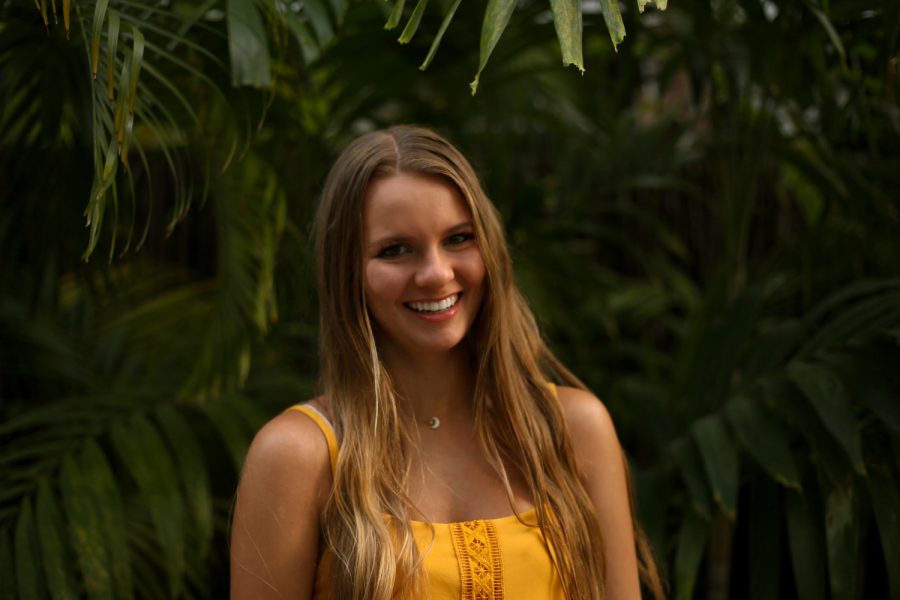Opinion | I spent three months in another country during the COVID-19 pandemic
After making the choice to leave the county due to my weakened immune system, I spent three months living in a country with greater restrictions.
May 3, 2021
For the past three months, I signed into my Zoom classes with a backdrop of palm trees and hibiscus flowers, and frequent visits from curious lizards climbing the side of my laptop. I drank my coffee cold, wearing tank tops, and eating pineapple. Meanwhile, snow piled up at home.
It was an odd sight. My friends often joked that they were jealous of my newfound tan and that there was no better place to read the complete anthology of Samuel Beckett than the beaches of Antigua. But the story that led me to leave the country and move 2,000 miles away was darker than my sunny background showed.
As an immunocompromised person, I made the decision in December 2020 to leave the country and move in with my sister, who lives in the Caribbean country of Antigua, because of the risk COVID-19 posed to my health.
After a two-week total quarantine and a negative COVID-19 test, I was finally able to rejoin the world. But the second I stepped outside, I was stunned by the differences.
Antigua is one of two small islands in the Eastern Caribbean that form the nation Antigua and Barbuda. With a population of about 80,000 people, Antigua is best known for tourism, which makes up nearly 60 percent of its GDP and 40 percent of investments. Lush and stunning, it felt like I was going on vacation instead of fleeing the loose COVID-19 restrictions of the U.S.
But COVID-19 is not limited to the borders of the U.S., and the worldwide scale of the pandemic was on full display. For the past year, Antigua has chosen to enforce a State of Emergency and a curfew.
From February 15 onward, the curfew became earlier, from the previous 8 p.m. to 6 p.m. every day of the week. To leave the house without a designated pass from the government was to leave yourself open to a fine of $10,000 E.C. (about $3,700 U.S. dollars) and/or six months in prison.
All bars, restaurants, and gyms remained closed. Gatherings were limited to five people. And, as of February 15, there were only 427 cases in total across the island.
For perspective, there were 468 in Iowa on February 15 alone. And, as I sat beside my sister in her kitchen, I couldn’t help but believe I made the right choice in leaving after all.
Whereas at home, I received pictures daily of anti-mask protests and experienced horror stories from my fellow essential workers, there wasn’t much of a visible struggle in Antigua. The general consensus of the people I spoke to was that, while the restrictions could be irritating, the only way to move forward was to listen.
When I did leave the house outside of curfew hours, either to pick up groceries or take out, I never saw a single person without a mask. Designated handwashing stations monitored by attendants were outside of every store, and you could not enter without sanitizing.
In March, Antigua and Barbuda began distributing the AstraZeneca vaccine to members of the population. As of now, the countries have distributed more than 29,754 vaccines accommodating for about 15 percent of the population of the two islands. Among the recipients were my sister, her boyfriend, and a few other people I had grown to know over the past few months.
And, by my last month there, Antigua reopened restaurants, bars, and shifted the curfew backward, first to 8 p.m., and then to 11 p.m. With COVID-19 cases declining and members of my close circle vaccinated, I was comfortable enough to go to a few outdoor restaurants and meet other new people. For the first time in nearly a year, I had a small taste of normal life again.
But just as I was comfortable, the days on my visa began to tick down and I knew I had to return home.
Antigua was a beautiful dream, but it wasn’t real. My reality was getting on a plane once more and bickering with other passengers who refused to wear masks as soon as I landed in Georgia. The reality was the sensation of safety being brutally ripped away at the reminder that I am still immunocompromised. The fear I carry with me will not end until Americans come together or are entirely vaccinated.
Now, with a fresh vaccination mark in my arm and two weeks of online classes left, I’m home again and left grappling with what it meant.
I experienced what I consider to be the best and the worst of America over the past year. Looking back, I wonder what might have happened if I stayed home — if I would have been one of the few lucky ones, or if my worst fears about the virus would have come true.
The honest answer is that I will never know. What I do know is that I will never regret the time I spent in Antigua or the lessons it taught me. Education isn’t limited to a classroom. It’s earned through life experiences, through tests that challenge everything you thought you knew.
We grow in uncomfortable places. We are forged in situations we never expected. And even now that I am home, there is a part of me that is a little older, a little sadder, and little more hopeful than I was before because I took a risk I could live with, rather than continue to risk something I felt I couldn’t.
The pandemic is ending. What shouldn’t end is the memories of what we, as an international society, endured.
Columns reflect the opinions of the authors and are not necessarily those of the Editorial Board, The Daily Iowan, or other organizations in which the author may be involved.



